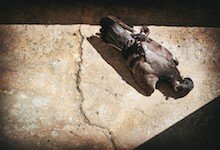
Mya Kabyar was born in 1974 in Palewa, Chin state. He grew up and finished high school in Chin state, then studied philosophy and graduated from Rangoon University by distance. Mya Kabyar felt the beauty of poems and began writing when he was in high school. His first poem on the depiction of the Chin land was published in a student magazine in 1990. He has been living in Yangon since 1994.
Influenced by contemporary Burmese poetry, in particular Maung Chaw Nwe and Zawgyi, Mya Kabyar experiments with themes of nature, home and belonging. In his most famous and influential poem ‘Chin’, from the collection of the same name, Mya Kabyar ambivalently explores notions of Chin ethnicity and place, influenced by the postmodern turn in Burmese poetry. As he explains, ‘the poem “Chin” contains postmodern ideas. Chin identity can’t only be found at one place, you can find it in so many places.’
Unlike many ethnic minority poets in the periphery of Burma, Mya Kabyar writes in Burmese language, and since his arrival in Yangon he has published regularly in magazines and journals, although the media he is featured in is either for a Chin or a Christian audience. While Mya Kabyar is Buddhist, the majority of Chin are Christian so theological journals such as Metta Taman and Alinain have provided a welcoming home for his work. Mya Kabyar’s first book, Chin, was published in Rangoon, Myanmar’s former capital. While Mya Kabyar writes in a postmodern style, popular in Burmese poetry, he sees himself as outside the Burmese literary scene, which he describes as separate to the Chin literary scene: ‘It seems to be difficult. I didn’t try to enter because for me I think it is hard to be part of that community.’ He remains highly influential within Chin literary circles as one of the leading Chin contemporary poets.
Apart from his career as a poet, Mya Kabyar is also a political activist. He helped found the Chin Progressive Party, where he serves as an Executive Committee member.







